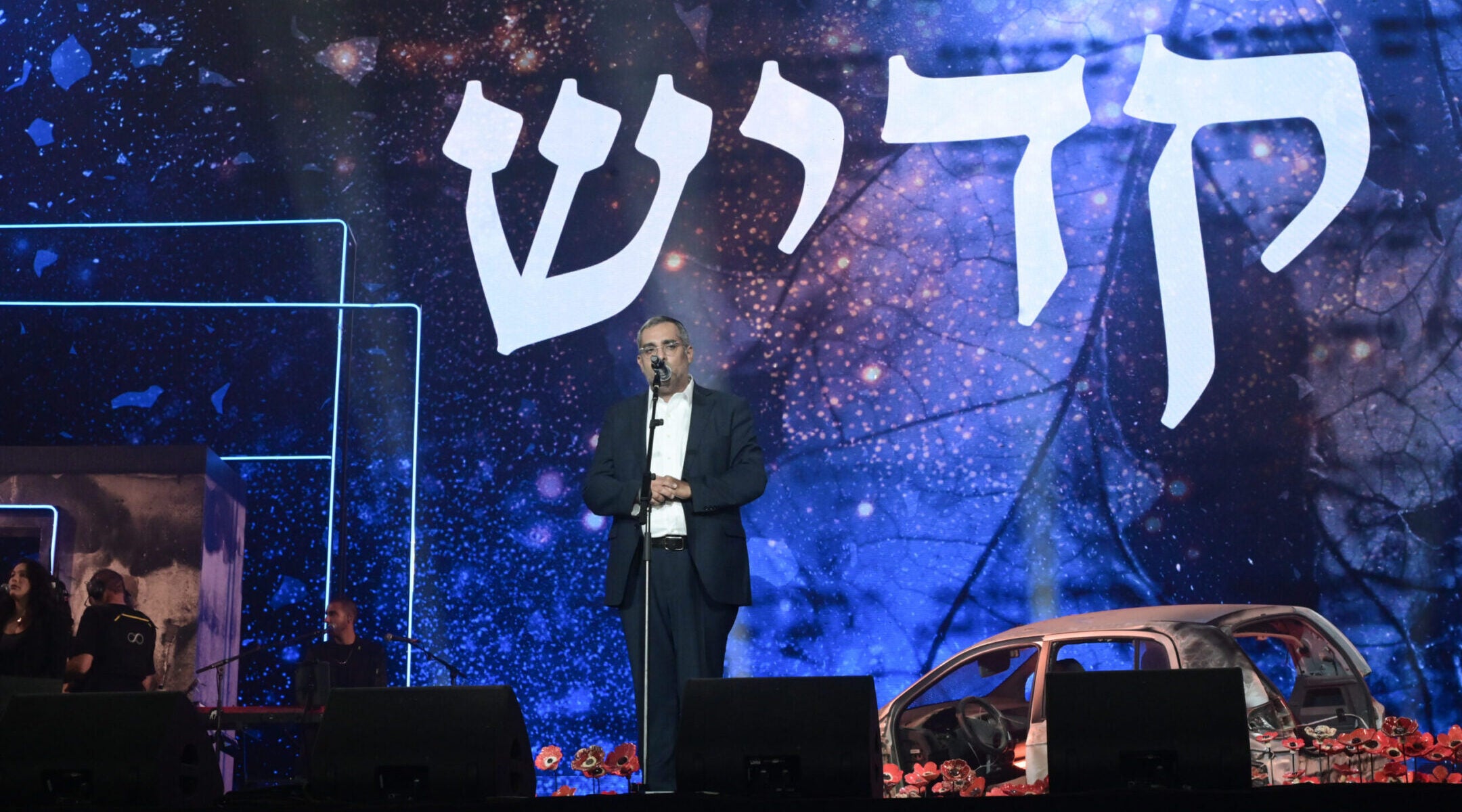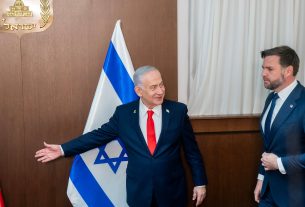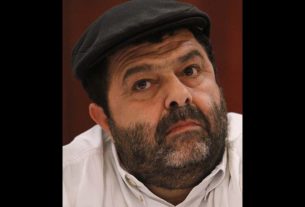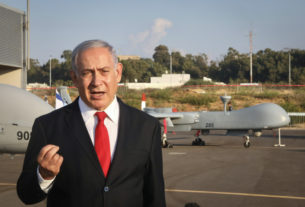On the second anniversary of the Hamas massacre, Israelis grappled with how to mark the date which overlapped with the first day of Sukkot, when Jewish tradition requires festivity.
The government postponed official remembrances until the day after the Simchat Torah holiday that bookends Sukkot rather than the Gregorian anniversary. Prime Minister Benjamin Netanyahu came under fire for initially failing to acknowledge Oct. 7 directly, writing a social media post that read simply “Happy Sukkot.”
The convergence of the festival’s religiously required joy with the memory of mass death set off a broader debate over whether celebration and grief could coexist. Some religious leaders and community groups, including the Reform movement, urged weaving remembrance into holiday rituals — lighting candles, reading names, adding prayers for the fallen — while others argued that Sukkot’s happiness should remain intact, with official mourning deferred.
Some Israelis traveled south to visit sites of the attacks, including at official memorials at some of the kibbutzes that were devastated on Oct. 7, but larger crowds were expected on Wednesday, the first of the intermediary days of Sukkot. Travel is prohibited on the first day for those who adhere to traditional interpretations of Jewish law.
Even among the bereaved, observance varied. British-Israeli Gaby Young Shalev, whose younger brother Nathanel Young, a soldier, was killed in action on Oct. 7, said her family chose to celebrate the festival with friends and relatives before turning to commemoration.
Gaby Shalev, at left, lost her brother on Oct. 7. She attended a memorial held in Tel Aviv’s Yarkon Park on Oct. 7, 2025. (Deborah Danan)
“I tried not to think about the fact that it’s Oct. 7. Because I really think it’s important that we don’t let these atrocities of Oct. 7 ruin our chagim,” she said, using the Hebrew word for Jewish festivals.
But once the holiday day ended on Tuesday evening, Young, her parents and sister Miriam went to Tel Aviv’s Yarkon Park for the Oct. 7 memorial organized by Kumu (“Rise Up”), an initiative set up by families of victims and hostages as a counterpoint to the official state ceremony.
The event was livestreamed globally and screened simultaneously at Hostages Square. It opened with released hostage Agam Berger performing the theme from “Schindler’s List” on violin. Between speeches from hostage relatives, bereaved families and released captives, well-known Israeli musicians performed on a stage that was a tableau of symbols: a burned-out car like those destroyed along the Gaza border, encircled by red crown anemones — the national flower and an emblem of remembrance — a bullet-riddled bomb shelter, and 48 suspended yellow chairs representing each hostage still in Gaza.
Singer Yuval Rafael, who survived the Nova festival massacre and later represented Israel at Eurovision, sang with Daniel Weiss, whose parents were murdered by Hamas. Zvi Zussman, father of Maj. Gen. (res.) Ben Zussman, killed in December 2023, recited the Yizkor prayer, while Elchanan Danino, whose son Ori was kidnapped and later murdered in captivity, recited the Mourner’s Kaddish.
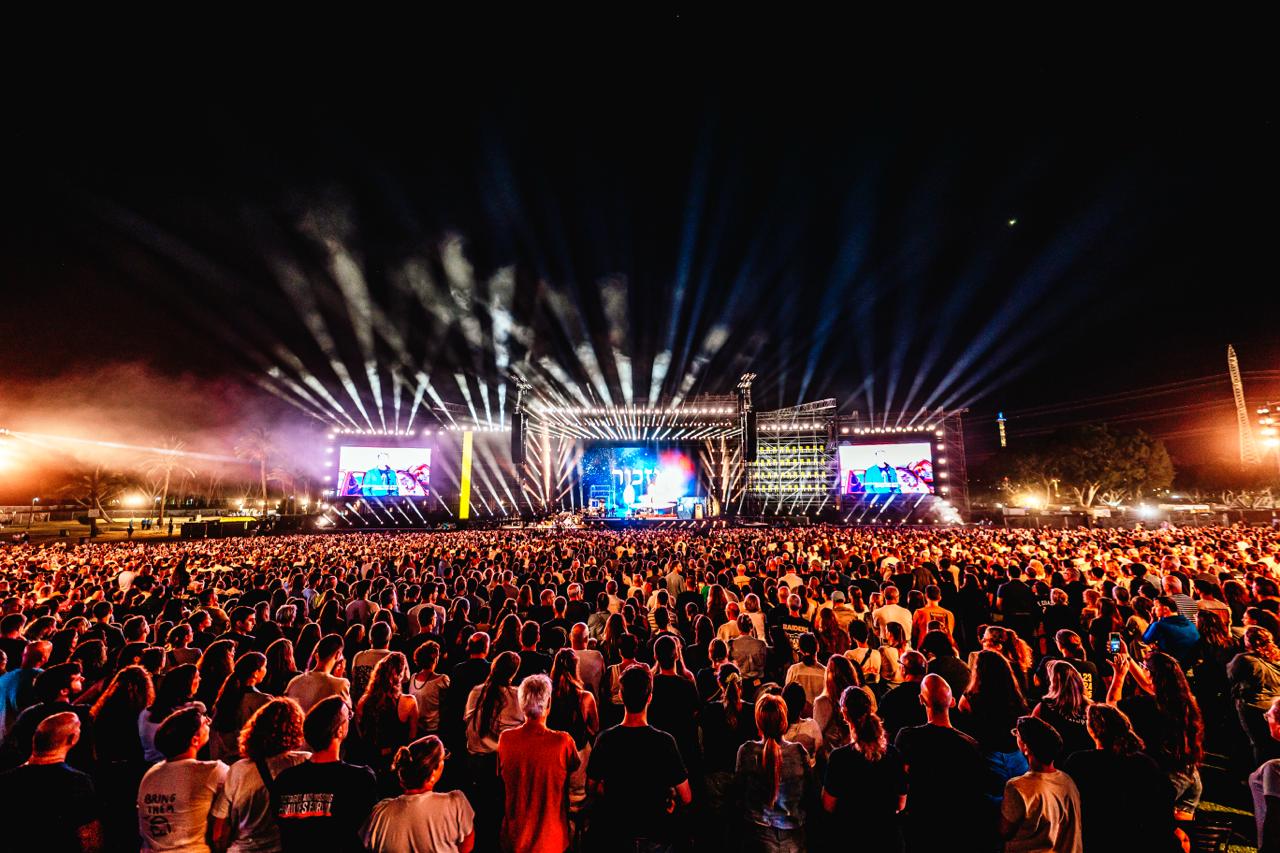
A public memorial marking the second anniversary of Hamas’ Oct. 7 attack on Israel took place in Tel Aviv on Oct. 7, 2025. (Eclipse Media)
Eurovision contestant Eden Golan addressed the livestream in English, saying the nation “had been holding its breath” for two years and calling for the release of the 48 hostages still held in Gaza. She performed “I’m Coming Home” as images of hostages filled the screen behind her. The crowd erupted in chants of “Everyone, Now,” the slogan that has become shorthand for demanding their return.
Unlike last year, the memorial was open to the general public and drew an estimated 30,000 people. In 2024, 50,000 tickets had been reserved by the public but organizers were forced to curtail attendance to the press and victims’ families amid security threats. For Young, the crowd’s size this year conveyed a collective response beyond those most directly affected.
“It’s a reminder that it’s not just about the bereaved families or the families of hostages,” she said. “The whole country is mourning.”
At last year’s memorial, Young told the Jewish Telegraphic Agency that it was the first time her brother’s death had truly sunk in. In the months before, she said, her family’s grief had been buffered by “happy” distractions — the birth of her twins, her parents’ aliyah from the United Kingdom, and the flurry of projects created in Nathanel’s memory. But as another year passed and she returned to the same spot this October, the sense of loss felt sharper. The passage of time, she said on Tuesday, had made his absence harder, not easier.
“We realize that Nathanel’s not just on a long holiday, but that he’s not actually coming back,” she said. The release last month of the army’s year-long investigation into what happened on his base that morning, she added, made the loss feel newly immediate. Still, “we live life with a lot of purpose,” she said. “We keep his spirit alive by asking, even in the most everyday situations, what would Nat do?”
Young said she resonated deeply with an image shared on stage by fellow bereaved speaker Tomer Zak, whose parents and younger brother were killed in the attacks. Zak compared herself to a tree that had lost its leaves but whose roots remained strong. For Young, the metaphor captured the tension between devastation and resilience.
“When other people look at it from the outside they’re like, how can this person continue with their lives? But the memory and the light from the person we lost, from Nathanel, makes us keep going, makes us stronger. It gives us these magic powers — you basically want to do all these things for them,” she said.
To that end, the family have set up a memorial fund in his name to support projects for youth at risk, including young people with ADHD and other forms of neurodivergence, reflecting what she described as Nathanel’s determination to overcome his own setbacks in life and help others do the same.
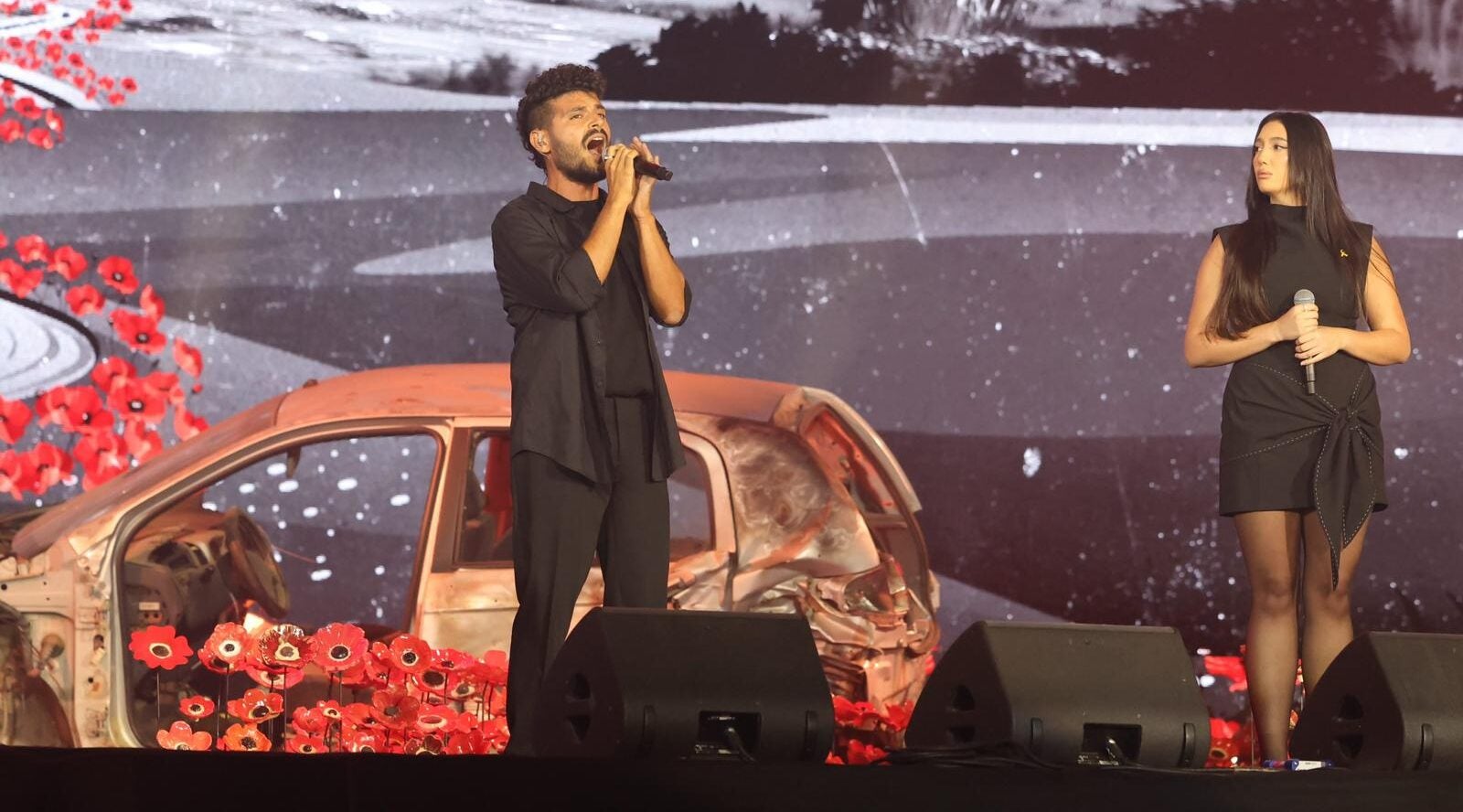
Daniel Weiss and Yuval Rafael sing a duet at an Oct. 7 memorial event in Tel Aviv, Oct. 7, 2025. (Photo by Idan Sorani)
A few miles east in Bnei Brak, the atmosphere was strikingly different. Late at night, Hasidic music blasted from the Beit Hashem synagogue during a simchat beit hashoeva — a Sukkot celebration where worshippers dance and play music late into the night during the holiday’s midweek nights. Men in fur streimels streamed inside while children chased one another through the narrow alleys.
Asked about the tension between celebration and mourning, several attendees said they were unaware the Gregorian anniversary of Oct. 7 had arrived. Down the road, emissaries of the Chabad-Lubavitch movement had erected a roadside sukkah draped with yellow Mashiach flags — contrasting with the yellow hostage ribbons ubiquitous at the Tel Aviv memorial — and were handing cotton candy to children.
Yossi, one of the Chabad volunteers, said the date did not change their message. “We pray every day for the return of the hostages and the safe return of the soldiers. In all our daily prayers and also when we read from the Torah,” he said.
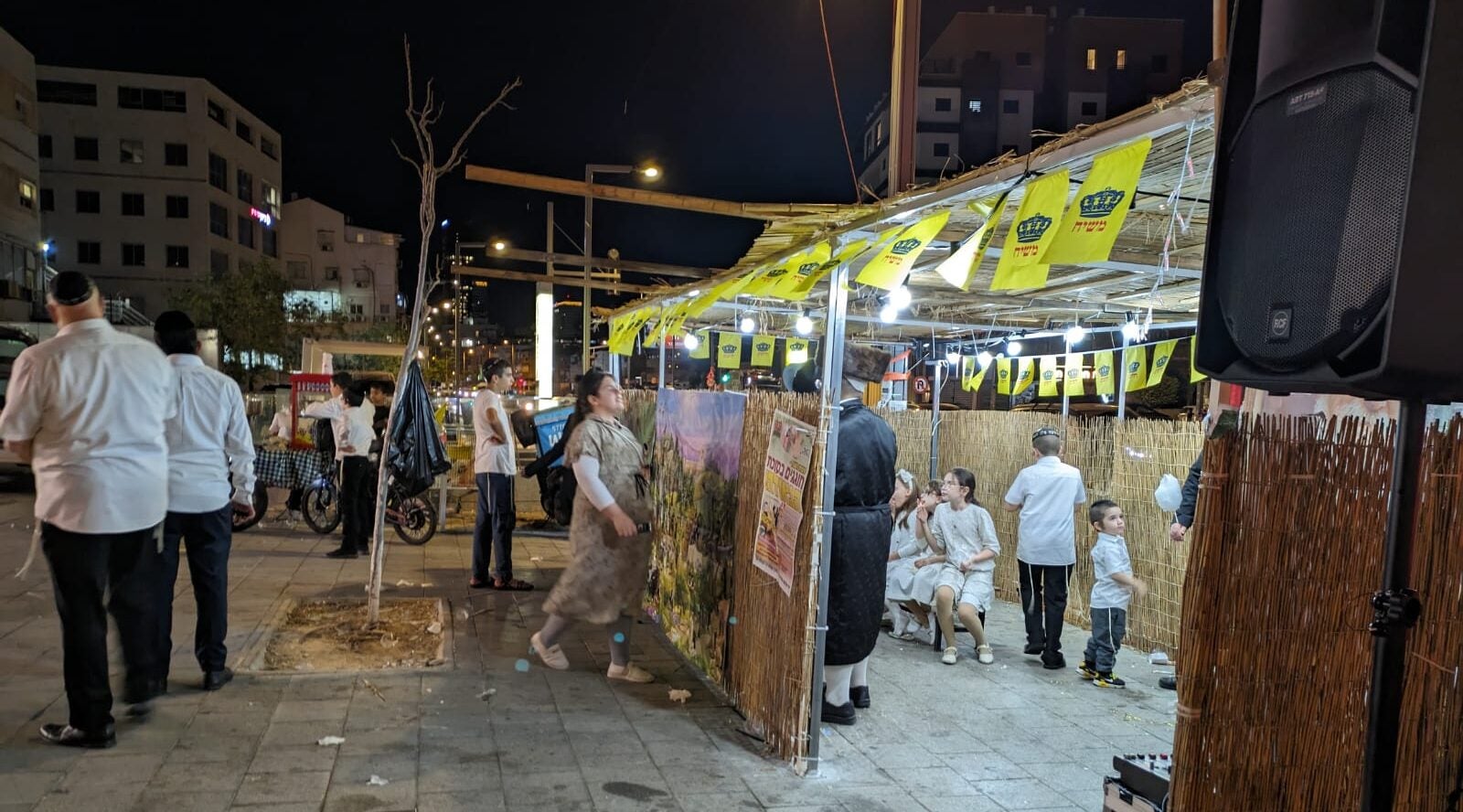
A sukkah in Bnei Brak, Israel, displays yellow Chabad flags on Oct. 7, 2025. (Deborah Danan)
A woman in a tank top said that despite identifying herself as secular, the attack’s timing would fix the memory to the Hebrew calendar. “I can’t separate from the fact that it happened on Shabbat and also such a joyous festival — Simchat Torah. [Hamas] took that from us forever.”
In Holon, south of Tel Aviv, Eyal Golan spent the day at home. His youngest sister Shirel, a Nova festival survivor, died by suicide shortly before the first anniversary of the attacks. He could not bring himself to attend a memorial, he said, but added that looking after his two small daughters, the youngest of whom is a newborn, took precedence.
“The mental is affecting the physical,” he said of the migraines he was suffering. “I felt a sense of emptiness all day and I struggled with my own PTSD just to function.”
As the event in the Yarkon Park wrapped up, the crowd stood to sing Israel’s national anthem. For Young, the moment tied mourning to resolve. “It’s a collective grief but also a collective hope, that’s how I felt at the end of ‘Hatikvah.’ Yes, we are all grieving, but there’s something with Am Yisrael, with the Jewish people and with Israeli people. We keep going.”
Keep Jewish Stories in Focus.
(JEWISH REVIEW) has documented Jewish history in real-time for over a century. Keep our journalism strong by joining us in supporting independent, award-winning reporting.

